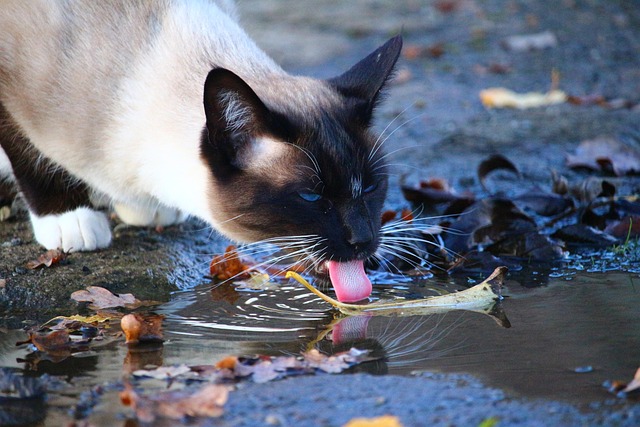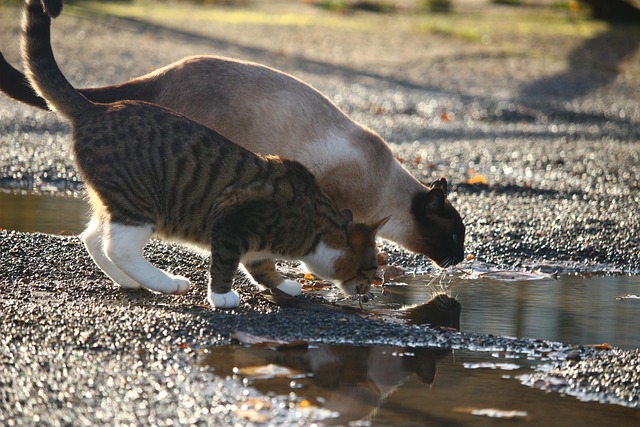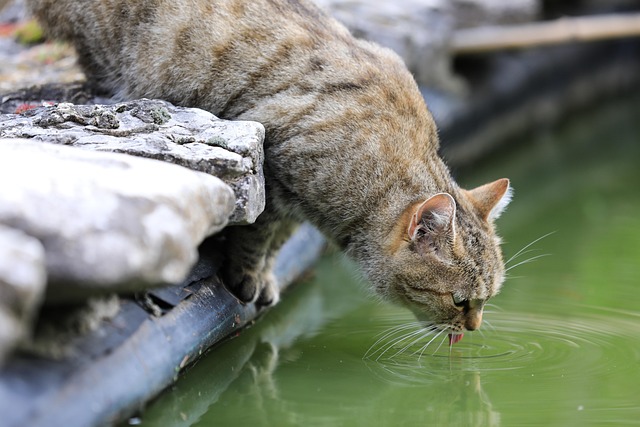For cat owners, supplying their pets with a bowl of fresh water is innate; however, if this is not done, your cat may seek out another source of water. You may be surprised to know that cats can tolerate drinking seawater—much more effectively than humans. This ability is attributed to specific adaptations in a cat’s kidneys, which enable them to consume salt water without causing health problems.
Domestic cats should drink fresh water. The intake of saltwater should be limited. Excessive salt can significantly impact a cat’s health. Continue reading to learn how cats can safely drink small amounts of saltwater.
Can Cats Drink Salt Water?
Our contemporary housecats trace their lineage back to African wildcats, which thrived in arid environments where securing sufficient water for survival posed a challenge. Consequently, these early cats adapted by deriving most of their hydration from their diet, eating natural prey with high water content, such as birds and rodents, to sustain their hydration levels.
However, cats still necessitate a source of water, and fresh, clean water was not always available on the African plains. This scarcity compelled these cunning cats to often resort to saltwater pools as their drinking source.

Their kidneys evolved, and over time, cats developed excellent renal capabilities that enable them to concentrate their urine more effectively than other mammals—including humans—and to eliminate excess salt. An early study shows that cats can drink salt water, in conjunction with their food, to survive in the absence of other water sources.
But what relevance does this have for our present-day domestic cats? Our loved pets are typically nourished with either wet or dry commercial cat food and are given a fresh bowl of water. Can they drink salt water as well? Research has demonstrated that cats can rely on their food to fulfill their entire hydration needs, and a cat that consumes wet food may seldom use their drinking water.
However, if the food is partially dehydrated, cats can go to salt water or oceans to provide their hydration. With modern dry food options, the water content is significantly low, and a cat may need to drink a huge amount of salt water to achieve adequate hydration, thereby increasing the risk of ingesting excessive salt.
Is It Good For Cats To Drink Saltwater?
It is understood that cats can drink salt water to stay hydrated in addition to their dietary water intake. However, is it good for cats? As the name suggests, salt water contains a significant amount of salt, along with other nutrients like nitrogen and phosphorus.
Drinking too much salt water can lead to an increased salt intake in cats, resulting in health issues. Salt poisoning occurs when a cat’s blood sodium levels rise excessively (a condition known as hypernatremia), which can lead to dangerous imbalances in vital electrolyte levels.
Symptoms of this condition may include extreme thirst, vomiting, diarrhea, lack of coordination, tremors, seizures, and in severe cases, coma or death.
Determining the precise amount of salt water required to induce salt poisoning is difficult. Pure salt (sodium chloride) can lead to issues even in small amounts, but salt water is generally less harmful, particularly if your cat has access to wet food or fresh drinking water.
There is no necessity to intentionally provide salt water to your cat, as there is no scientific evidence supporting its health benefits; rather, it is known that cats can survive by drinking salt water alongside their food when necessary.
Commercial cat food is designed to supply all the required salt, minerals, and electrolytes in appropriate ratios. Cats are very good at concentrating their urine and typically have a low thirst drive, meaning they do not often feel compelled to drink. This is especially true for cats on a wet diet. They will only resort to drinking salt water if it is essential for their survival rather than for optimal health.

What Should My Cat Drink?
Cats can drink various types of water, ranging from regular tap water to bottled or freshwater sources. It is essential to avoid alkaline waters. Due to their low thirst drive and high renal concentrating ability, cats have lower water requirements compared to some other mammals; however, they should always have access to a clean and fresh water source.
Cats that are on a dry diet tend to drink significantly more water than those that consume a wet diet, as they are adept at obtaining their water from food. While cats can also drink other appropriate liquids, such as cat milk or broth, clean water remains their primary necessity.
If you observe that your cat is suddenly drinking more than usual, it is recommended to consult a veterinarian. Certain medical conditions, including urinary issues, kidney disease, hyperthyroidism, and diabetes, can lead to increased thirst.
Should your cat appear to be continually seeking out saltwater, such as from a swimming pool or a saltwater fish tank, ensure that their regular water bowl is easily accessible and consistently filled with clean water. Following this, it is advisable to consult your veterinarian, as your cat may have a medical or nutritional issue.
Saltwater And Cats: Final Results
Cats have kidneys that are highly adapted and can drink salt water for hydration when necessary. It is still advisable to offer fresh water as the primary source of hydration for your cat, in conjunction with an appropriate diet. However, there is no cause to panic if you observe your cat drinking from a saltwater source, like saltwater, unless they show signs of illness or distress.
Source: Cats.com



Leave a Comment